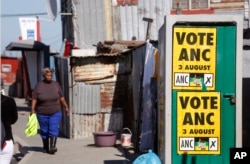Like many South Africans, 26-year-old academic researcher Rudolf Du Plessis previously supported the ruling African National Congress.
But as local elections loom Wednesday, he, like many South Africans, is leaning toward the opposition. The ANC, which has dominated every national election since it came to power in 1994, is slowly but surely losing its luster amid numerous corruption scandals and widespread outrage over persistent inequalities.
And so, many voters, like Du Plessis, say they might switch sides in the election as 60,000 candidates vie for some 9,000 spots.
“I just think that South Africa needs a stronger opposition party,” he said. “I mean, it’s just better for politics. It’s better to have some competition, and some sort of monopolistic political system isn’t really conducive to anything good.”
But the opposition Democratic Alliance has much bigger goals.
“Not since 1994 has this city stood on the brink of such monumental change,” said the party’s Johannesburg mayoral candidate, Herman Mashaba. “The race for Johannesburg is neck and neck, and the overwhelming momentum behind the DA is encouraging – we are confident we can win.”
Mashaba may be a bit optimistic. While the latest Ipsos poll predicts that the ANC will lose support in the economic hub of Johannesburg, neither party is predicted to take the City of Gold outright. The poll predicts that the ANC will clinch 31 percent; the DA, 36 percent.
Demographic shift
But the shift away from the ANC is playing out in a demographic the party once considered its stronghold: the poor and disadvantaged. In Johannesburg's poverty-stricken area of Eldorado Park, 32-year-old DA activist Stacia Matthews said her grandmother is a staunch supporter of the party that Nelson Mandela brought to power. But she isn’t.
“The ANC has done nothing for me,” she said. “Even the ANC has done nothing for my granny. She’s still living in her old house, she doesn’t have lights (electricity). And for me to be part of ANC, there’s no reason. That’s why I moved to DA.”
Her local representative, Peter Rafferty, grew up in this impoverished area, and says the community still feels ignored by the ANC and that corruption has delayed the long-promised changes. The DA has made this a pillar of their platform.
“I think one of the things that we are fundamentally proud of is that we will give them a corruption-free government,” he said during a campaign stop.
The ANC still has widespread support, in particular among black South Africans, who credit the party for ending the racist apartheid system.
“ANC, we know what it has done for us, right,” said 25-year-old financial adviser Paul Teboho. “We also know, or we can predict, what it will do for us. But with other parties, I’m not quite sure whether I can vote for them or not.”
The ANC has lost voters to the far-left Economic Freedom Fighters, a relatively new party which appeals to youth. The opposition parties have pounded the ANC over a barrage of corruption scandals this year, even calling for Zuma’s impeachment.
Unlike the ANC, which President Jacob Zuma has said will rule until “until Jesus comes back,” the DA says it will take it one election at a time. Zuma’s second and final term ends in 2019.
“We’re the only party that says, just give us this one chance to show you that this is what we can deliver,” Rafferty said. “If we don’t deliver in the first five years, then don’t vote for us.”






